Written by Wale Ameen
Affiliate Disclaimer: Our product review team dedicates hours of research, fact-checking and testing to recommend the best solutions to business owners. We earn from qualifying purchases through our links, but this does not influence our evaluations. Why trust our reviews?
Butcher shops or meat shops are a basic component of neighborhoods and as such, play an important part of our everyday lives. They process and package fresh meat and allied products for sale.
In a hurry? Skip ahead to important sections in this guide:
- How to Start a Butcher Shop in 9 Easy Steps
- Bonus Step #10
- Benefits of a Butcher Shop POS + How Much Does it Cost?
- Comparing the Best Butcher Shop POS Systems
- Brilliant POS
- NRS
- Café Cartel
- Best Meat Inventory Management Software
- Final Thoughts
- FAQs
How To Start A Butcher Shop
According to Statista, in 2021 there were approximately 146,000 butchers and meat cutters in the United States, and in the same year, meat cutters in the US earned on average $17.15 per hour.
Again, according to IBISWorld, the butcher and meat market industry has consistently grown alongside per capita meat consumption and consumer spending within the last five years up until 2022.
This essentially means that if you run a meat market and butcher shop, you might be in for a continued increase in demand for a number of years to come. If you are yet to open one, this is also one of the best times to set up and start a butcher shop.
So what does it take to start a butcher shop or meat shop? Let’s jump in as we analyze the following steps:
9 Steps To Start A Butcher Shop
- First Decide On What You Want To Sell And Butcher Shop Concept
- Develop Your Business Plan
- Getting Funding For Your Butcher Shop
- Acquire Necessary Permits And Licenses For Your Butcher Shop
- Secure Ideal Location For Your Butcher Shop
- Make Necessary Payments For Equipment For Your Butcher Shop
- Hire Your Butcher Shop Staff
- Deploy Your Marketing Strategies For Your Butcher Shop
- Launch Your Butcher Shop
1. Decide On What You Want To Sell And Your Preferred Butcher Shop Concept
The very first step in your journey to set up your butcher shop is to decide on the scope of your butcher and meat shop operations. This covers the market you want to target and attract at your butcher and meat shop. Different butcher shops tend to focus on selling and specializing on different types of meat.
You can also decide to adopt a specific butcher or meat shop type, and these include: being a traditional shop that basically sells the generality of meat that a family needs or a specialty meat shop that appeals to individuals like vegans, which means you will be offering alternatives to meat to cater to the growing population of vegans.
A good way to know which is ideal and will be more profitable is to carry out a survey and get to know what people really want and would prefer. Another angle to this, is to look at what is currently being offered by other businesses and your likely competitors.
Once you can spot a pattern, you can then decide what is ideal for you to settle on.
2. Develop Your Business Plan
After you have settled on the type of butcher shop or meat shop you will be running and the types of meat you will be offering, the next thing you want to do is develop a business plan. Your business plan will essentially spell out in concrete terms what you see as the future of the business. Important sections your business plan should have include:
- Executive Summary: This is the summary of all of the information that is in the business plan and it highlights the important sections like your goals and the potentials in the butcher shop and why you are going into the business.
- The Company Description: Here you provide an overview of the company, and here you treat in a more detailed manner items such as your goals, projections, and strategies you intend to deploy in reaching the set goal.
- Menu concept: Provide a detailed description into the concept for your butcher shop and the items you intend to sell.
- Ownership and management structure: Let prospective readers who will be likely investors in the business know your ownership and management structure. Who reports to whom and who calls the shot. Also what is the hierarchy like?
- Employee: Detail the number and the type of employees that you need to adequately run your butcher shop.
- Market Analysis: This section answers the question of who your target market is. It also provides a highlight of your potential competitors.
- Advertising and Marketing Strategy: In this section, highlight what your marketing plans are and how you intend to reach your potential customers.
- Financial: Here you tell readers about your financial projections, expected costs and the road to profitability.
3. Getting Funding For Your Butcher Shop
This is a major point that will go a long way toward determining how well your butcher shop comes through. Funding is the lifeblood of every business, and as such, it is important to get this right. On one hand, you might be prepared with personal savings to kick off the business, but if this is not the case, then you will have to look at the option of securing loans.
If your plan is to secure a loan for the business, then your business plan will come in handy, as this is what any financial institution will require of you in order to evaluate if your business is worth advancing a loan to.
4. Acquire Necessary Permits And Licenses For Butcher Shops
Before you begin, you will need to sort out any necessary registrations, permits, and licenses that may be required to legally run a butcher shop. To do this, you should check with your local authorities to know what applies in your specific environment.
Some of the registrations and permits you need to secure include:
- Business registration: Your business registration gives your business a legal standing to legally operate within a state, province or country. The process to doing this and the requirements will vary from state to state and even country to country and as such, you must do your research to know how and what is required within your particular locality and state.
- Health License: This is usually issued by the state in which a business operates. As noted above, this will vary from state to state and you’ll need to know the terms for your own state.
- Sellers’ Permit: There are different associations that regulate the activities of different types of business from state to state. You will need to check up and see which one applies to butchers within your operational base.
By doing this, you will ensure that your operations are legal. Asides from this, you will also need to ensure that your products are sourced from approved sellers in order to ensure that they meet required standards and are fit for consumption.
5. Secure An Ideal Location For Your Butcher Shop

- Closeness to your target market: An important factor to consider when citing virtually any type of business is to ensure that you are well situated and not far from your target market or centrally located to be reachable by them.
- Closeness to the source of materials: While this may not be totally accurate, you still want to ensure that your butcher shop is not so far from farms and poultry houses where your meats are sourced in order not to make transportation of products a herculean task.
- Closeness or otherwise to your competitors: As much as you may not want to be too close to your competitions, you should also consider the fact that there are things you could gain from each other and as such you should put this also into consideration.
6. Make Necessary Payments For Equipment For Your Butcher Shop
Once you have decided on the ideal location and possibly gone out to secure it, the next thing you want to sort out is getting the necessary equipment your butcher shop will require. A butcher shop will require tons of pretty sharp cutting tools. Some of these include:
- Butcher knives and sharpeners
- Grinders
- Scale for measurement
- Refrigerators and freezers
- Meat slicers
- Protective clothes and gloves
- Other items like trays, soaps and plastic wraps.
- POS system for meat shop
- Meat inventory management system
I shall discuss in detail the importance of getting a good POS system and give my recommendations on the best POS system for a butcher shop later.
7. Hire Your Butcher Shop Staff
Butcher shops have different departments and, as such, require various staff members to manage each section. While some will be interfacing with customers at the front of the house to take orders, others will largely be at the back of the house, where a major part of the operation goes on with cutting, packing, and sorting products. Some important staff members you will be needing are:
Some butcher shop workers you need are:
- Butchers: Butchers are probably the number one individuals of a butcher shop. This is because their work is central to the operations of the butcher shop. They are responsible for the cutting and slicing of meats and weighing and preparing them for sale.
- Packers and loaders: Next you will require workers who will be responsible for packing and moving the products from the back of the house into freezers and all.
- Sales Attendants: The sales attendants are the front of house staff members. Depending on the size of your butcher shop or meat shop, you may require between one to as many as three, four sales attendants.
- Cooks and chefs: If you plan to include the sale of food along with your meat sales, then you will need cooks and chefs who will be responsible for that part of the shop.
8. Deploy Your Marketing Strategies For Your Butcher Shop
Once you are done hiring the right staff for your butcher shop, you are just a few steps away from launching it. The next thing you want to do is carry out some marketing campaigns in order to spread the word about your services.
Some of the marketing strategies you want to deploy include:
- Develop your digital presence through launching your website: A digital presence is an important part of marketing strategy. Components of your digital presence include developing a website, social media handles, setting up Google My Business etc.
- Set up a visually appealing website: Your website is a vital component to the success of any business in today’s world and as such you must take this as an important step.
- Offer special promotions: To celebrate the opening of your butcher shop, one way to attract first time customers and invite them to have a first time experience of your products is by running special promotions. This will bring in new customers who will hopefully fall in love with your style and become repeat customer
- Create an appealing loyalty program: Each and everyone one of us love to be pampered and appreciated. One sure proof way to retain customers is to offer incentives and a good way to offer incentives is by having a loyalty program set up for customers.
9. Launch Your Butcher Shop
As you finish up all the required steps, you inch closer to the D-day when you’ll launch your butcher shop ready to serve customers and begin to make sales. One way to go about this is to plan out a series of launch activities. I have highlighted some steps that you should consider:
- Soft launch: With a soft opening, you can give yourself that room to first get the thoughts and opinion of some individuals. At this stage you offer those that show up samples of your products and get their thoughts on all aspects of the business. This is with the aim of using the feedback gotten to improve your preparedness for a full blown grand opening.
- Grand opening: With the grand opening, you go all out to make noise about your newly opened butcher shop and get in the numbers with special promotion that can span the entire day or even days.
Bonus Step #10. Get A Good POS System For Meat Shop
One of the vital equipment or solutions you need to effectively run your butcher shop is a butcher shop POS system. A meat market and butcher shop point of sale system is used to calculate the amount owed by the customer at the point they want to buy their meat. That’s why these programs generally contain a means of weighing the product. It’s one of the most critical components of a meat market POS.
A point of sale system for a butcher shop also boasts other features, like extensive inventory control, customer loyalty programs, and employee management. Meat markets have been around a long time, but they can n
o longer function with just a cash register.
The Benefits of a Meat Market and Butcher Shop POS
A meat market point of sale system brings a ton of advantages to even the smallest of shops. Benefits of this system include:
- Extensive vendor relationship management with data-based decision making.
- Software and hardware dedicated to calculating measurements of weight for various items.
- Loyalty programs to boost consumer engagement and thank repeat customers.
- Flexible pricing programs that work with your individual software and hardware needs.
- Ability to accept all forms of payment from customers, including contactless.
How Much Does a Butcher Shop POS Cost?
The price of a meat market and butcher shop POS varies because some systems require you purchase the hardware along with the software. Unlike POS programs for other industries, the meat industry has certain hardware requirements that are unique, like scales.
Subscription prices are generally based on how many terminals you need or the type of hardware bundle you choose. It ranges from free up to a few hundred dollars a month. Some companies also give you the option to purchase the software outright (for approximately $600). The cost of hardware varies by need as well. Most shops already have a scale in place.
Comparing the Best Butcher Shop POS Systems
| System | Starting Software Costs | Hardware Costs | Key Features |
|---|---|---|---|
| Free, approx. $10, $30, and $40 per month or $600 (one-time fee) |
Quote based | Track inventory in real-time based on weight |
|
| Cost for the POS bundle is $1,299.00 with $19.95/month for service and support |
Cost for the POS bundle is $1,299.00 with $19.95/month for service and support |
BR Club Loyalty Program comes free with every POS system |
|
| $50/month or $695 (one-time fee) | $50/month or $695 (one-time fee) | Customer house accounts can be opened and tracked |
1. Brilliant POS – The Point of Sale System for Smart Scales

The program runs on both the cloud and a local database. When the internet goes down, you can still access your data and reporting. Brilliant integrates with leading business apps in marketing, accounting, staff management, e-commerce, and more.
Features
Brilliant POS has features designed to accommodate the butcher shop environment. These include:
Smart Scales
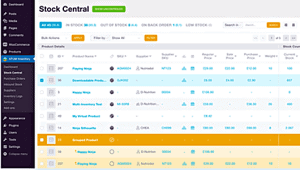
This includes standalone scales, scanner-scales, and deli scales. They have something to meet the specific needs of every type of shop.
Inventory Control
When your staff is cutting away a quarter pound at a time, keeping track of exact inventory can be challenging. Keep your meat market organized by tracking inventory count based on weight in real-time.
This ensures every business stays stocked up, 100% of the time. You can set low stock alerts, automate reordering, and manage vendor relationships all within a unified dashboard.
Simplified Payment Processing
Account set up is always free. There is no application fee or cost to begin.
The Brilliant system can process:
- Cash
- Credit/Debit
- EMV chip
- Contactless payments
Money comes quickly. Funds are available the next day for uber-fast deposits. A dedicated account manager will be there to help you set up and maintain your account. Free support is there 24/7/365 to answer any processing questions that arise.
Customer Engagement
The meat market business thrives on return customers. People really get to know their local butcher. A business can offer a points-based program with discounts and free items. This includes custom branded gift cards.
Boost your email campaign list by sending receipts via email rather than printing them. Your logo can be uploaded and added to receipts as well. The system even allows a butcher shop to create discount flyers that can be emailed out.
Price
Brilliant POS comes with flexible pricing packages depending on the equipment you purchase.
Clover Mini, Clover Flex, and Clover Mobile
- Payments Plus – Free
- Customer engagement marketing
- Employee permissions and shifts
- Electronic signatures and tips on-screen
- Send and store digital receipts
- Accept all forms of payment
- Register Lite – $9.95
- Everything the Payment Plus offers
- Basic inventory management
- Basic order management
- Personalized setup and training
- Register – $29.50
- Everything the Register Lite offers
- Advanced item management
- Advanced order management
- Connect to weight scale, kitchen printer, menu, and table management
Clover Station
Register – $39/month
- Employee permissions
- Advanced item and order management
- Monitor sales in real-time
- Capture electronic signatures
- Supports 11.6” touchscreen
Cash Register Express
- CRE or RPE – $599 (one-time)
- Integrated signature capture EMV pin pad
- Advanced item and order management
- Access cloud reporting from anywhere
- Personalized setup and training
- Supports 21.5” touchscreen
2. National Retail Solutions (NRS) – The Point of Sale Platform for Customer Loyalty

NRS has independent retailers across the country and continues to expand with 10,000+ POS systems installed in the last few years.
Features
National Retail Solutions offers a lot of benefits for a business owner to run a meat market and/or butcher shop. Here are just a few:
Vendor Management
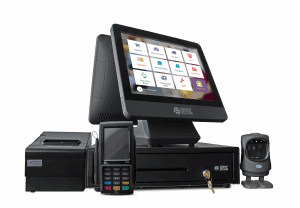
Buying from so many vendors can prove difficult to track. Especially when it comes to where your money is going.
The NRS POS lets you record each item bought by vendor so you can accurately report later on. This helps to identify trends, like which vendors work with you the most.
A business can then prioritize relationships based on the data. It can also show when the time might be to renegotiate contracts. It effectively drives data-based decision making.
Weigh Meat and Other Products
To count meat prices, you have to know the weight. If you sell meat by weight, a scale is particularly essential. A scale or belt scanner/scale combo can be added to any NRS equipment bundle so items can be weighed during checkout.
Once a price per pound is set, the scale does all the calculations. The software can also read labels on a scale you already own.
Sell Meat When It’s Fresh
In a butcher shop, it is critical to sell items as fresh as possible. The NRS POS software helps to understand consumer preferences to ensure you are stocked up on the products that leave shelves the most.
This means your items are always fresh. You are not overordering or guessing on inventory. It’s smart stock management.
Offer a Loyalty Program
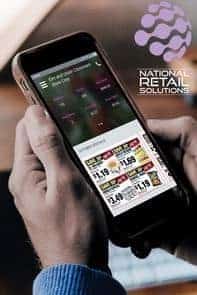
Especially when you are ordering things special. The NRS platform allows a business to create in-store promotions and add automatic discounts at the time of checkout.
BR Club Loyalty Program comes free with every POS system. When the customer saves money, it gets paid back to your business from NRS. Today, there are over 3 million existing customers for the program that has generated more than $10 million in sales.
Price
National Retail Solutions offers the point of sale system in a bundle. It has a:
- Dual-screen POS terminal
- Barcode scanner
- Receipt printer
- Cash drawer
Installation and training are also included. The cost for the bundle is $1,299.00 with $19.95/month for service and support.
3. Cafe Cartel – The Point of Sale System for Tracking and Analytics
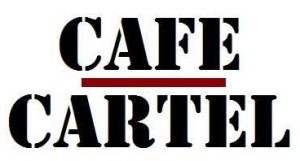
They are dedicated to providing a fast and reliable solution for meat markets and butcher shops with competitive pricing.
Features
The Café Cartel boasts a variety of features for a butcher shop that includes:
Smart Inventory
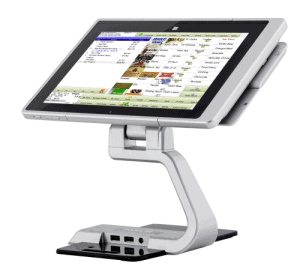
Any inventory that leaves the deli can be easily reconciled. All in-house inventory can be tracked with portion control and reported on.
Employee Management
The larger the shop, the harder it is to keep track of everyone. The Café Cartel system enables easier employee management through staffing, scheduling, and payroll features. Employees can clock in and out straight through the system and maintain their weekly schedules.
Customer Retention
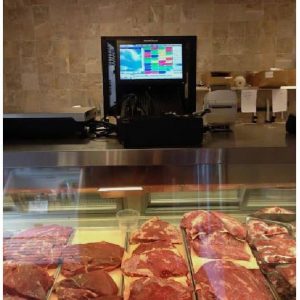
Café Cartel POS offers a rewards and loyalty program to boost customer retention. House accounts can also be opened to track and strengthen consumer relationships.
Additional Features:
- Catering
- Business analytics
- Output to QuickBooks for accounting
Price
Much like other meat market POS systems, the pricing for Café Cartel is very flexible.
Multiple Terminals
- Free
- Must have qualified processor agreement.
- No long-term contracts.
Subscription First Terminal
- $50/month
- No set-up fee or contract.
- No charge for training.
- They will install the system.
- Get up and running fast.
Additional Terminals
- $35/month
- Apply for the discount after more than three terminals.
Terminal Software
- $695 (one-time fee)
- No subscription costs.
- Required for use outside US and Canada.
Additional Terminals
- $495 (one-time fee)
- Goes with software package.
- Required for use outside US and Canada.
Entire POS Systems
- $600+
- Call for a custom quote.
One of the important processes you need to document is the inflow and outflow of the meat in your butchery shop. This will help keep stocks in good condition and ensure proper rotation and best practices.
While the point of sale solutions highlighted above can be tweaked to a large extent and their inventory management system adopted and used as a meat inventory management system, you may want to opt for a comprehensive meat inventory management system. If this is the case, I recommend VistaTrac.
VistaTrac – Best Recommended Meat Inventory Management System
I recommend VistaTrac because it is a dedicated meat shop inventory management system with over 30 years in operation. It is largely used by wholesale meat sellers, online retail and custom processing companies. VistaTrac has virtually all the features you need to manage your meat shop’s inventory processing and management.
What Are The Features of VistaTrac?
Live Animal Receiving
The VistaTrac inventory management solution allows you to document the receipt of your meat, record their weights, tally loads and vendor data. You can also compare live weights to hot weights and view receiving reports.
Allows For Custom Processing
With VistaTrac, you can create custom slaughter orders along with instructions on the cut process for each customer’s animal processing.
Comes With Shopify Integration
VistaTrac comes with direct integration with Shopify capability which enables you to sync your inventory into your Shopify database.
How Much Does VistaTrac Cost?
VistaTrac operates two pricing packages namely: VistaTrac Small Business and Vistac Enterprise.
Small Business: Plan cost starts at $325 /month and comes with finished goods and raw materials traceability, integrations with Quickbooks and Quickbooks Online and add on modules. It provides only online support for this plan.
Enterprise plan: Starts at $1100 /month and comes with add ons and customizations, and integrations with QB/Sage/Microsoft/ERP. 24/7, 9-5 support is provided for this plan.
Who Are The Likely Competitors To Your Butcher Shop
While preparing to launch, you should also take note that you will be setting out to compete with some established brands that will come around as direct competitors to your operations. As such, you must be prepared to ensure that your service and butcher shop is uniquely positioned to stand out.
Some competitors to your butcher shop include:
- Supermarkets
- Online butchers
- Convenience stores
- Farm shops, farmers markets etc
Does a Butcher Shop Need a License?
Before opening your butcher shop, you will need to possess some permits and licenses from your state authority. This gives your operations a legal backing and shows that you are aligned with appropriate legislation. To know which to apply for, check up with your local authorities.
Final Thoughts
The meat market is an increasingly booming industry and one that will continue to be profitable even in the next foreseeable years to come. If you were ever considering opening one, now is apparently one of the best times to do so.
Frequently Asked Questions
Is a butchery profitable?
Running a butchery business is a highly profitable and rewarding venture. It currently provides a comfortable source of income for thousands of entrepreneurs across the United States of America.
How do I start a butchery shop?
The 10 steps to starting a butchery shop are:
- First Decide On What You Want To Sell And Butcher Shop Concept
- Develop Your Business Plan
- Getting Funding For Your Butcher Shop
- Acquire Necessary Permits And Licenses For Your Butcher Shop
- Secure Ideal Location For Your Butcher Shop
- Make Necessary Payments For Equipment For Your Butcher Shop
- Hire Your Butcher Shop Staff
- Deploy Your Marketing Strategies For Your Butcher Shop
- Launch Your Butcher Shop
- Manage Your Butchers Shop With A Good POS
What qualifications do you need to be a butcher?
The necessary course types to be a butcher differ from region to region. You should check with your national academic board to confirm the appropriate course to take to become a butcher.
What do butchers sell?
Butchery shops cut and sell fresh meat. They also sell other allied products such as baked goods, grocery items, and snacks.
Where do butchers make the most money?
According to Indeed, the highest paying cities for butchers in the United States are:
New York, NY. $20.90 per hour
Chicago, IL. $19.60 per hour
Philadelphia, PA. $19.00 per hour
Dallas, TX. $18.81 per hour
Houston, TX. $18.42 per hour

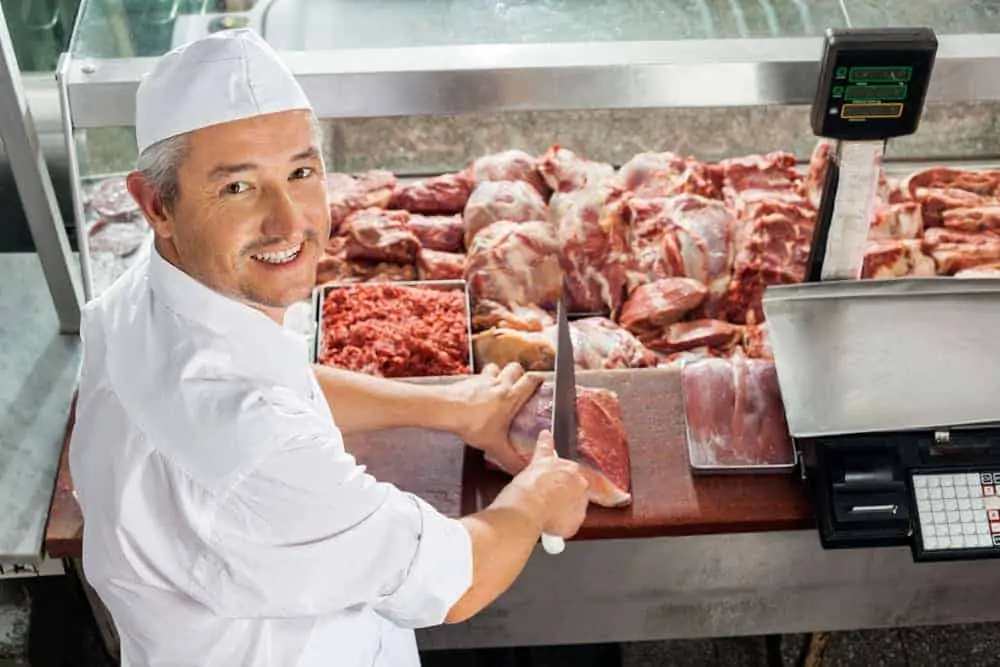
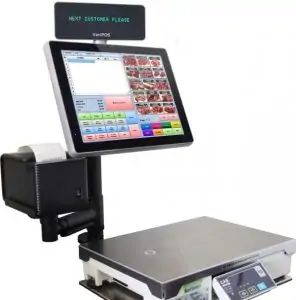

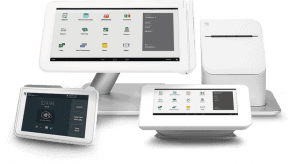 Register – $39/month
Register – $39/month